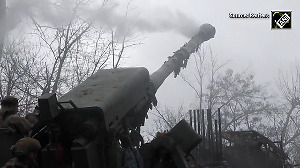ExxonMobil-owned RasGas will supply liquefied natural gas by December to restart the Dabhol power project in Maharashtra, a top official said on Friday.
"Negotiations with RasGas have been good and I can confirm Qatar LNG will be available by December-end for the Dabhol power project," petroleum secretary M S Srinivasan, who spearheaded the negotiations for sourcing LNG, told reporters.
RasGas would supply 2.5 million tonnes per annum of LNG to Dabhol for two and half years, a time during which the new promoters of the 2,184 MW project would tie-up long-term supplies.
"We are tying loose ends... all I can say is that power generated (using LNG from Qatar) will be competitive," he said declining to give the LNG price.
LNG from Qatar will be regassified at Petronet LNG Ltd's Dahej plant in Gujarat (the plant has surplus capacity to process close to 2 million tonnes of additional volumes over and above the current imports of 5 million tonnes). "We are are in talks with Shell for using their Hazira terminal," he said.
The 2.5 million tonnes of LNG for Dabhol would be in addition to Petronet Ltd's contract for additional 2.5 million tonnes (over and above the current supplies of 5 million tonnes) that would begin flowing from 2009.
India plans to restart the 740 MW Phase-I, shut since 2001 following a payment dispute with MSEB, by September 2006 using naphtha as LNG receipt facilities at the Dabhol site would not be ready before the end of the year.
Srinivasan said Dabhol plant's new owner Ratnagiri Gas and Power (jointly owned by GAIL and National Thermal Power Corp) would start importing LNG on long-term supply contract by mid-2009.
Petronet currently imports 5 million tonnes per annum of LNG from RasGas at Dahej in Gujarat at $2.53 dollars per million British thermal unit (price exclusive of shipping and regasification cost) but the additional 2.5 MTPA, which may come from RasGas Train's 4, 5 and 6, may cost over $4 per mBtu.






 © 2025
© 2025